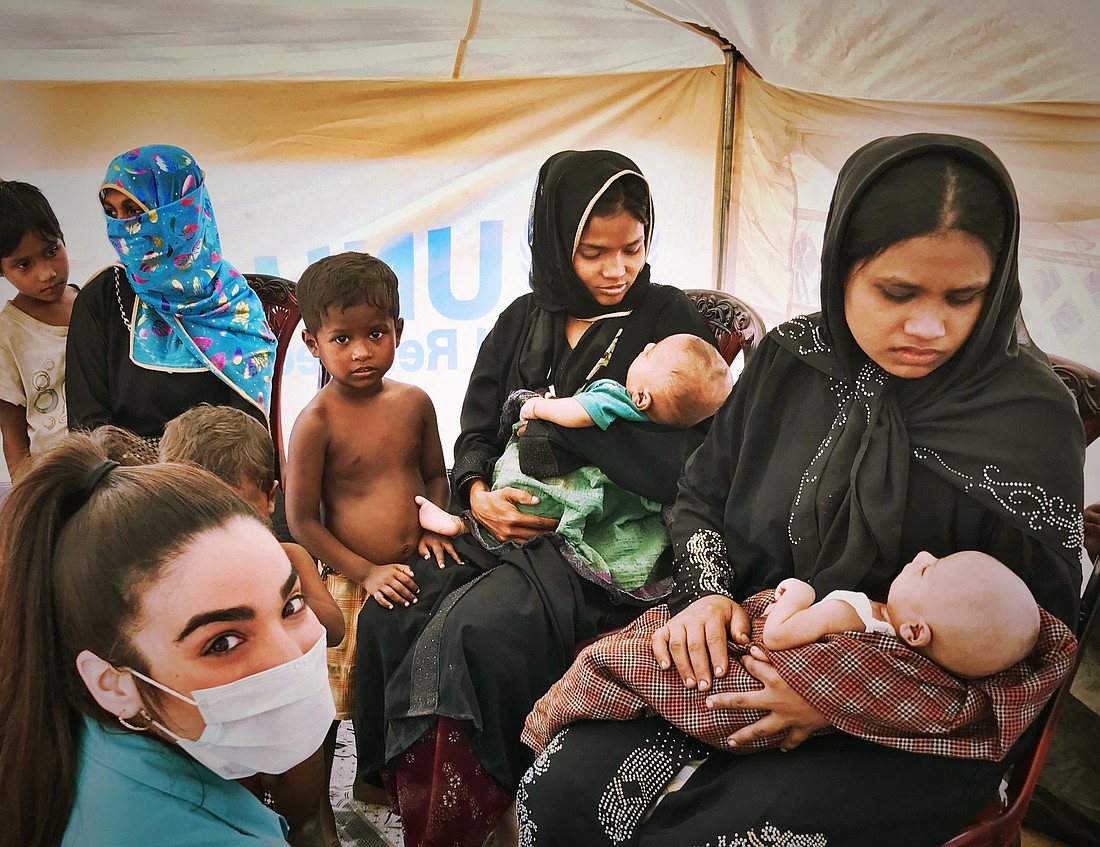- April 25, 2024
-
-
Loading

Loading

Winter Park resident Ryah Silvestri had never seen anything like it — hundreds of thousands of people living in huts built from trash bags and stalks of bamboo.
She arrived in Cox’s Bazar in Bangladesh last October, and remembers making the drive to the settlement in a white passenger van. The landscape of the camp was a series of hills slick with mud, so Silvestri and her group had to enter the camp on foot.
As Silvestri gazed upon the village of shacks wrapped in plastic, families with malnourished children stared back.
“They were zombies; they were just walking zombies,” Silvestri said. “All I kept seeing was babies and children and women. It was just death — it smelled like death, it looked like death.”
The people Silvestri had traveled so far to see were Rohingya — stateless refugees from Myanmar who had fled from their homes due to violence and genocide.
Whether that persecution was for political or religious reasons, it didn’t matter. Silvestri said she felt a calling to help.
That’s what brought her to the camp — the goal of establishing a clinic for the injured and diseased.
Refugees travel on foot for 10 to 12 days to get to the camp in Cox’s Bazar, drinking water from puddles along the way — some while nursing gunshot wounds.
About 1,000,000 refugees reside in the camps, Silvestri said.
“They’re just stateless, so they’re not allowed to leave the 2,000 acres that were given (for the camps),” Silvestri said. “They can’t leave, they can’t marry, they can’t work.”
LIFE CHANGE
Silvestri’s reasons for coming to Bangladesh can be traced back to a trip to Istanbul last August. She was coming up on a year after passing the bar exam and was practicing transactional law — helping people from other countries move their assets into the United States. She was working overseas in Istanbul and was enjoying some shopping when she saw something that changed her life.
“I was walking around in Istanbul, and I’d see families in the streets — I’d never seen that before,” Silvestri said. “I’d only seen people who didn’t have children or babies (in the United States), because DCF would come, and the babies would be off the streets right away, it just wouldn’t happen. … I remember in that moment — while I was going shopping and spending frivolous amounts of money on things that weren’t necessary — that I was wasting my life. … In that moment I said, ‘OK, something’s wrong. This is not the life I want to lead.’”
Silvestri returned home with a new perspective and decided it was time to make a change. She left her career as an attorney to instead work for a nonprofit to benefit people in need.
“I started looking at the world in a way that I’d never done before,” Silvestri said.
She eventually decided on helping the Rohingya in Bangladesh — a more recent crisis in the world that desperately needed attention.
BEE HUMBLE
Silvestri started a charitable organization called Bee Humble, and partnered with nonprofit Planting Peace to get her vision of a clinic off the ground.
That medical tent was approved by the Bangladesh government last month and now provides general and preventative care. The clinic sees about 1,000 patients every week and recently finished a mass deworming of 60,000 people.
“Intestinal worms can take 20% to 40% of your nutritional value from you,” Silvestri said. “(The refugees are) already not getting much in the way of nutrition, so the deworming really helps with combating acute malnutrition and the health of the children and families.”
But Silvestri said her mission has just begun. She wants to spread the reach of Bee Humble across the globe, and hopes to start a similar clinic in Ethiopia.
Silverstri realizes she’s found a sense of home in the midst of helping those with nowhere else to go.
“I felt so safe, at home and at peace in the camps,” Silvestri said. “It felt so right that I knew it was my calling. I knew it was home for me.”